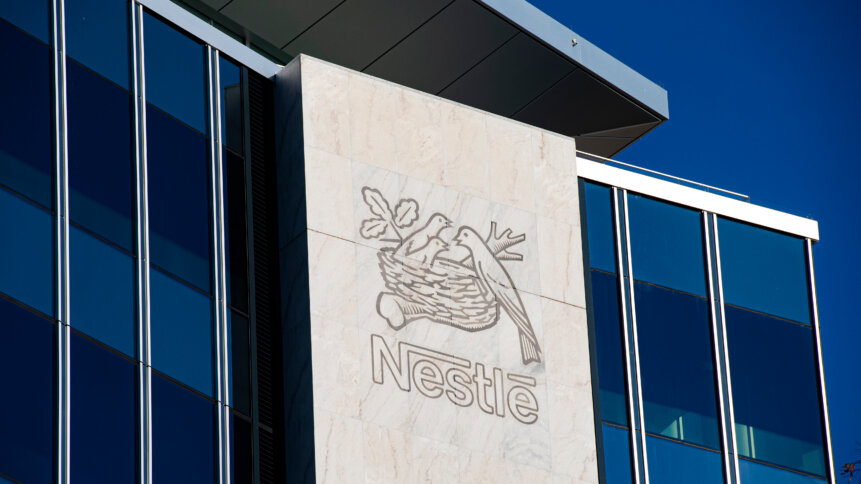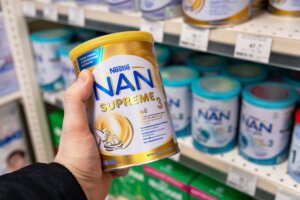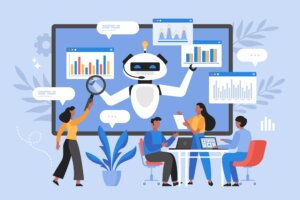
- Nestlé is using AI to provide optimized marketing campaigns.
- But the brand remains tainted by the ‘baby milk scandal.’
- AI tools can work to both improve and destroy a brand’s reputation.
Don’t panic, your chocolate isn’t going to be turned into a virtual experience just yet, but Nestlé has officially joined the ranks of companies that are integrating AI into their businesses in one way or another.
In February, the food and drinks titan announced that its 15,000-person-strong marketing division would utilize AI tech to help run campaigns across social platforms while maintaining brand consistency. This meant that creative assets produced for any of its 200 brands must be run through an AI system trained on its strict marketing do’s and don’t’s.
The system, named Cortex, comes from creative consultancy CreativeX, which states on its website that “Brand consistency has been shown time and time again to drive lift across both brand and sales KPIs.” An attractive prospect for Nestlé, which hasn’t had the smoothest ride regarding company reputation. In short, it needs to improve its image, consistently.
It took its largest and most notorious blow about 50 years ago when campaign groups started highlighting what’s now known as the ‘Nestlé baby milk scandal’. In the 1960s, many infant formula companies shifted their campaigning to developing countries to depict it as “scientific, modern, prestigious, and (falsely) nutritionally superior to breastmilk.” Nestlé sent salespeople out to countries in Latin America, Asia, and Africa to promote their products dressed as so-called “milk nurses”.

Nestlé Milk nurses in South Africa. Source: Crowther S M et al. (2009)
They pushed the line that this expensive formula would be more beneficial to children than what their mothers’ bodies produced, which is untrue. Nestlé was later accused of providing incentives to doctors to promote their products.
Many mothers in these developing countries diluted the formula to make it last, often with dirty water, which reduced its nutritional value. As a result, many infants suffered from malnutrition, dehydration, and various illnesses, leading to a higher-than-necessary infant mortality rate.
The aggressive marketing tactics that Nestlé and associated formula companies employed are said to have contributed to a decline in breastfeeding rates in these regions, where it was once the norm and a crucial source of nutrition and protection against diseases.
After health organizations began raising concerns about these unethical marketing practices, Nestlé’s reputation took a turn, and it received significant backlash and boycotts from consumers.
Over time, the company has attempted to address the criticism and improve its image by adopting changes in its marketing strategies. Nestlé now adheres to the International Code of Marketing of Breast-milk Substitutes, created by the World Health Organization and UNICEF in 1974, but activists and critics continue to closely monitor its practices to ensure compliance.

Nestlé now claims to adhere to the International Code of Marketing of Breast-milk Substitutes. Source: Shutterstock
The AI tool Nestlé marketers are using does not claim to be a reputational tonic. Aude Gandon, Nestlé’s senior vice-president and global chief marketing and digital officer, hopes instead that it will change the brand’s advertising focus from TV to digital-first.
When CreativeX was first recruited in 2021, its team trained an AI on thousands of previous Nestlé campaigns and their results. This meant it could learn the elements of these ads that drove the best ROI. Once the learning period was over, Cortex was able to analyze any creative asset and give it a ‘Creative Quality Score’ based on how many elements it contains which prove successful on a given social platform, like YouTube or Facebook. These include aspect ratio, video length, subtitles, and calls to action.
Staff must now put any asset through the AI before it goes live to ensure it is optimized for their chosen platform. According to Ms Gandon, this is to stop time-wasting during marketing meetings where attendees may disproportionately fret about whether minute details, like logo placement, impacted the campaign’s failure.
While the AI-determined rules may sound “unsexy”, as CreativeX’s chief executive Anastasia Leng told The Drum, they are not intended to replace the creative input of the marketers. “These are basic things that create the canvas on which an idea can be successful,” she said.
Cortex is not the only way Nestlé has integrated AI into its business. In 2021 it launched a ‘Cookie Coach’ named Ruth, a virtual avatar that could answer basic questions about its Toll House chocolate chip cookie recipe. Ruth was born from the number of questions on how to recreate these cookies that Nestlé received during the COVID-19 pandemic.

In 2021, Nestlé launched a ‘Cookie Coach’ named Ruth, a virtual avatar that could answer basic questions about its Toll House chocolate chip cookie recipe. Source: Nestlé
Research from Greyb also revealed that the company has filed patents for AI technologies that could recommend personalized dietary requirements. Nestle Health Science offers various nutritional supplements, like Boost Women, and provides data for screening and assessment tools that can recommend these products. These tools currently work simply by making recommendations based on the user’s responses to a questionnaire, but the patents suggest these could soon be further optimized with AI.
But could marketing teams use AI to repair a brand’s reputation? These days, many companies make use of AI-driven sentiment analysis to monitor online discussions, social media platforms, and customer reviews for negative opinions. These ensure that representatives can address any concerns in a timely manner and demonstrate that customer satisfaction is a priority.
Similarly, AI-driven moderation tools can be employed to identify and remove harmful or misleading online content and help preserve company reputation. It can also help prevent future scandals by detecting the initial indicators of an escalating situation, allowing brands to take immediate action. Many PR companies now offer AI tools as part of their packages.
Creatively integrating the latest AI-powered innovations could also provide the opportunity for a reputational clean slate. By introducing a never-before-seen feature or service that genuinely addresses customer needs and enhances their experience, a brand can shift the narrative away from past scandals and redefine the company’s image as an AI trailblazer.

Although AI can help with marketing campaigns and safeguarding brand reputation, it cannot fully replace human judgment and creativity. Source: Shutterstock
An example of this is how OpenAI itself, the creator of ChatGPT, was outed as paying workers in Kenya a maximum of $2 an hour to label violent, sexist, and racist text data as such so that it could be used to train an AI-powered safety mechanism for ChatGPT. Not long after, OpenAI released GPT-4, its most advanced system yet, to the public.
As much as advances in AI can help a brand’s reputation, they can also work against it. An example of this is the Cambridge Analytica scandal from 2018, where the data analytics firm misused advanced AI-driven techniques to harvest and exploit the personal data of millions of Facebook users without their consent.
This data mining operation aimed to build detailed psychographic profiles of individuals, which were then used to deliver targeted political advertisements and influence the outcome of elections, including the 2016 US Presidential election and the Brexit referendum.
While an increasing number of companies embrace AI to enhance the efficiency and effectiveness of their products and services, they also open themselves up to a host of potential controversies related to its use. While these may not be as high profile as what happened with Cambridge Analytica, a wayward chatbot or biased algorithm can inflict significant reputational damage.
The majority of AI tools can’t fact-check information, so companies that rely on generated content put themselves at risk of associating inaccurate information with their brand. Gartner predicts that 80 percent of marketers will deal with content authenticity issues by 2027.
What’s more, AI-derived copy can lack originality and personality, as it is produced by an algorithm that only works by re-assembling oft-assembled words and sentences. That tends to produce results that are safely generic. Chatbots are also open to manipulation and to proliferate bias from their training data, so aligning one with a company comes with a certain degree of danger.
As Ms Leng put it, many creatives are concerned that AI tools can only produce “cookie cutter” content. It is true that, although AI can help with marketing campaigns and safeguarding brand reputation, it cannot fully replace human judgment and creativity. Therefore it is crucial for companies like Nestlé to tread carefully, ensuring a balance between harnessing AI’s potential and preserving the essence of the human touch, if it wants to remain a household name.










